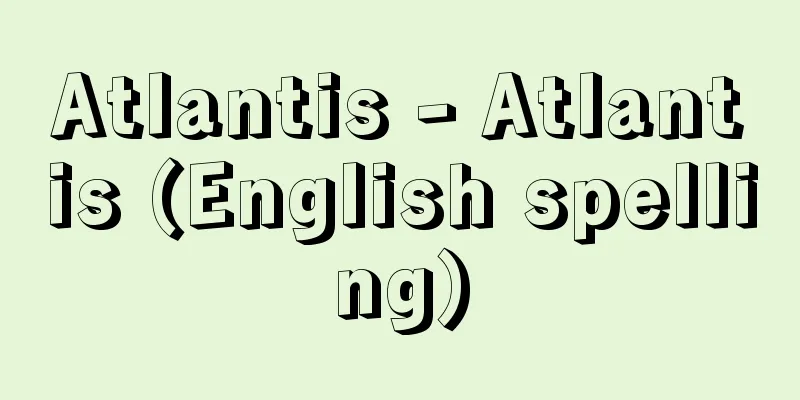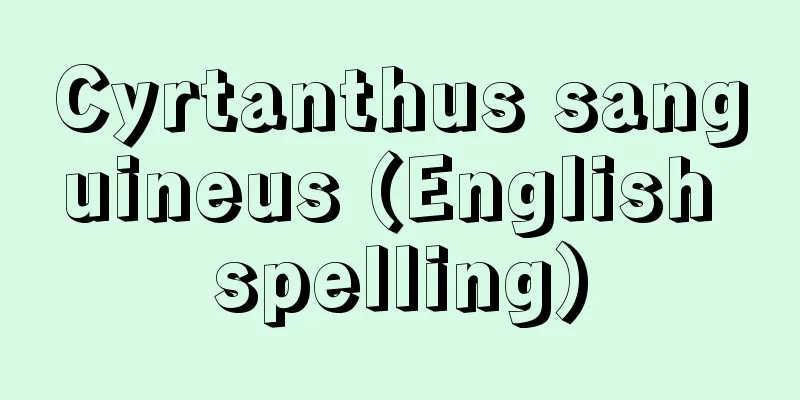Atlantis - Atlantis (English spelling)

|
A legendary island mentioned in the philosopher Plato's dialogues " Timaeus " and " Critias ." The island appears in a story that Solon, an Athenian lawgiver counted among the Seven Sages of Ancient Greece, told about the bravery of the "Old Athenians" more than 8,000 years ago when he traveled abroad in 594 BC after completing the important task of reforming the national system. The island, which is larger than Libya and Asia Minor combined, is located in the Atlantean Ocean (Atlantic Ocean) west of the "Pillars of Hercules" (Strait of Gibraltar), and was ruled by Atlas, the eldest son of the sea god Poseidon and Cleito, as king and his nine other brothers. The island was rich in mineral resources and agriculture, forestry and livestock, and prospered as a great maritime empire that controlled not only neighboring islands but also Egypt and Etruria inside the "Pillars of Hercules". However, the "Ancient Athenians" gained fame by preventing the invasion of Atlantis. The rule of the Atlantean Empire was inherited for several generations, but the decline of prosperity gave rise to an obsession with wealth, which eroded the spirit of reverence for the gods and obedience to the law, causing disorder. Then one day, an earthquake and flood occurred, and in one day and one night, the heroic "Ancient Athenians" were swallowed up by the earth, and Atlantis sank into the sea. In recent years, there has been a hypothesis put forward that links a volcanic eruption on the island of Thera around 1500 BC to the collapse of the Minoan civilization on Crete and links it to the legend of Atlantis, but this hypothesis is less persuasive as archaeological evidence to the contrary is stronger. [Keiji Baba] literatureAtlantis, along with the continent of Mu (Lemuria) said to have existed in the Pacific Ocean, has become a theme of science fiction as a lost world. Apart from Francis Bacon's New Atlantis (1627), the Atlantic theory is also mainstream in science fiction, and in Arthur Conan Doyle's The Deep Sea (1929), the descendants of Atlanteans are discovered, and in Jules Verne's Twenty Thousand Leagues Under the Sea (1869), their ruins are discovered under the sea. In E. E. Smith's famous Lensman series, volume 6, The United Forces of the Three Planets (1948), the continent collapses due to a nuclear missile being fired by mistake, and in Larry Niven's (1938- ) The Disenchantment of the World (1978), the collapse is caused by the disappearance of magic. Pierre Benoit's (1886-1962) novel Atlantides (1920) brought to the 20th century a queendom based on the Sahara Desert theory. Jane Gaskell's (1941- ) Queen of Atlantis trilogy (1963-1966) is a representative fantasy based on the continent of Atlantis. [Jun Atsugi] Source: Shogakukan Encyclopedia Nipponica About Encyclopedia Nipponica Information | Legend |
|
哲人プラトンの「対話篇(へん)」『ティマイオス』Tímaiosと『クリティアス』Kritiasのなかに語られている伝説の島。古代ギリシア七賢人の一人に数えられるアテネの立法者ソロンが、紀元前594年、国制改革の大任を果たしたのち国外旅行に出て、エジプトのサイスの神官から聞かされたという、そのときから8000年以上も昔の、「古アテネ人」の武勇ぶりを語る話のなかに登場する。 リビアと小アジアをあわせたより大きいその島は、「ヘラクレスの柱」(ジブラルタル海峡)西方のアトランティス海(大西洋)にあり、海神ポセイドンとクレイトーの長子アトラスが王となって、他の9人の兄弟とともに支配していた。島は鉱物資源や農林畜産に富み、近隣の島々のみならず、「ヘラクレスの柱」内側のエジプト、エトルリアをも支配する一大海洋帝国を形成して栄えたが、「古アテネ人」はアトランティス勢の侵略を防いで勇名をはせていた。アトランティス帝国の支配は数代にわたって継承されたが、繁栄の陰りが富への執着を生み、これが敬神遵法の精神をむしばんで秩序が乱れた。そしてあるとき、地震と洪水がおこって一日一夜にして、勇者「古アテネ人」は大地にのまれ、アトランティスは海中に没し去ったという。近年、ティラ島の前1500年ごろの火山噴火とクレタ島のミノア文明の崩壊を直結させてアトランティス伝説に絡ませる仮説がまま出されることもあるが、考古学的反証のほうが有力で、説得力が乏しい。 [馬場恵二] 文学アトランティスは、太平洋上にあったといわれるムー(レムリア)大陸と並び、ロスト・ワールド(失われた世界)として、SFのテーマとなる。フランシス・ベーコンの『ニュー・アトランティス』(1627)はさておいて、SFの場合も大西洋説が主流であり、コナン・ドイルの『マラコット深海』(1929)ではアトランティス人の子孫が発見され、ジュール・ベルヌの『海底二万里』(1869)では海底でその遺跡が発見されている。E・E・スミスの有名なレンズマン・シリーズの6巻『三惑星連合軍』(1948)では核ミサイルの誤射による大陸の陥没、ラリー・ニーブンLarry Niven(1938― )の『魔法の世界が消えていく』(1978)では魔法の消滅による陥没が描かれている。ピエール・ブノアPierre Benoit(1886―1962)の『アトランティード』(1920)はサハラ砂漠説による女王国を20世紀に現出させた。ジェーン・ギャスケルJane Gaskell(1941― )の『アトランの女王』三部作(1963~1966)はアトランティス大陸に取材した代表的なファンタジーである。 [厚木 淳] 出典 小学館 日本大百科全書(ニッポニカ)日本大百科全書(ニッポニカ)について 情報 | 凡例 |
<<: Atlantic Period - Atlantic Period
>>: Atlantic Codex - Atlantic Codex
Recommend
Netto, C.
...In 1880, this department was divided into the ...
boiling point
…The temperature at which boiling occurs is calle...
Kisui
…The total length is 2,620 km, and the drainage a...
Papago
...A prehistoric culture of American Indians that...
Phlox paniculata L.
A cold-tolerant perennial plant of the Polemonium ...
Hangesho - Summer flower
〘Noun〙① (The time when the pinecone buds grow) One...
Movietone
Fox started out in 1906 as the operator of the ni...
"Fragment of an Analysis of a Hysterical Patient"
...the name of a patient in a case report written...
Johnston, D.
Other playwrights with a strong connection to the...
International organization
An organization established by multilateral treat...
Hadano [city] - Hadano
A city in western Kanagawa Prefecture. It was inco...
Addition and subtraction
A method for solving simultaneous equations by mak...
Sueyoshi Akabane
Born: May 3, 1910, Tokyo [Died] June 8, 1990. Pict...
Kongobu-ji Temple
Located in Koyasan, Koya-cho, Ito-gun, Wakayama P...
Wolf (music) - Urufu
…This allows for the first time enharmonic modula...




![Ume [river] - Ume](/upload/images/67cf8f8119a3c.webp)




